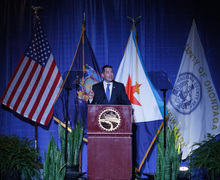Roth: Abroad columnist experiences challenges making Chilean friends
As international students from the United States, my friend and I were discussing the process of making friends while being a foreigner in a new city. I asked him if he had any Chilean friends, to which he replied, “Do people you meet at bars count as friends?”
The term “friend” here, I think, is applied loosely when talking about Chileans. I’ve been here for six weeks, and there are only a handful of Chileans outside of my host family that I talk to on a consistent basis, whom I consider my friends.
It’s easy to meet other international students at Pontificia Universidad Católica de Chile, where I am studying. We can be rather obvious — sometimes with lighter hair, loud English and, at least for me, looking lost.
Although my international friends and I can bond over our confusion of the Chilean university system and our touristy explorations, I’m looking for local friends. It’s the best way to understand the culture, the city and the language. Besides, I can meet other people from the States in the States.
There are two big challenges to making local friends: the language and the cliques within the Chilean university system.
Chilean Spanish is fast. They cut words in half and never pronounce the “es” of the last syllables of words. Some don’t move their mouth when they talk. Then there is the slang — the Chilenismos — which a language in itself.
“Cachai” is my favorite of the Chilenismos. It means, “right?” or “you know?” They add it on to the end of what feels like every other sentence.
It’s said if you can speak Spanish with Chileans, you can speak Spanish anywhere — which is another reason why I decided to study in Chile. The majority of people don’t speak English, or at least they’d prefer not to speak English. I like this challenge. When I’m speaking with bilingual people, I’ll switch into English rather than figure out how to say my thoughts in Spanish. If you really want a test of your Spanish ability, study abroad in South America.
My Spanish has improved incredibly. However, when I’m with a group of natives, it’s difficult for me to follow. Sometimes I’m too nervous about my Spanish to interject.
Living with a host family has really boosted my confidence and ability when it comes to Spanish. My family consists of my “mother,” a theater design professor, my “father,” an architect, my 25-year-old “brother,” a clown and student of natural medicine, and my 29-year-old “sister,” a radio host. I’m included in their family rituals. They’re patient with my Spanish and they laugh only at my really ridiculous mistakes.
Their support gives me more confidence when speaking with new people. I’ve made friends from my classes by making conversation with whomever I’m sitting next to, just like I do at Syracuse. However, most of the students in my classes at Universidad Católica already know each other.
Because the majority of the students at Universidad Católica are from Santiago, they don’t relocate to attend college, so they still keep friends from high school. Students take the majority of their classes within their major and with the same people. This creates an environment of cliques.
These groups manifest themselves on the campus’ lawn where students enjoy the warm weather and sun while eating lunch. It’s easy for me to find my Syracuse friends. I just need to look for blonde hair. ¿Cachai?
Danielle Roth is a junior majoring in magazine journalism and international relations. She is following her desires for good food and adventure in Santiago, Chile. Email her at dlroth@syr.edu or tweet at her @danielleroth.
Published on September 2, 2014 at 12:01 am





